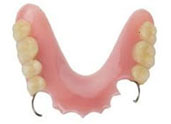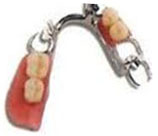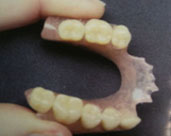|
How do I replace my missing tooth/teeth?
REMOVABLE OPTIONS: Dentures
False teeth on a “plate” that is held by clipping onto your natural teeth. You can remove it from your mouth
|
Advantages
- Don’t have to weaken any of the healthy teeth next to the gaps to facilitate the false teeth
- Most inexpensive option usually
|
Disadvantages
- Becomes loose over time
- Must be re-made every 3-5 years
- Not always as comfortable as other options
- May break
|
3 TYPES
|
1. Acrylic
Most inexpensive option
May break when dropped
More bulky
|
2. Chrome
Comfortable
Less bulk (thinner sections)
Strong
Chrome coloured (silver) clips
|
3. Flexible
Comfortable
Most comfortable, very thin
Clips are same colour as gums
Not everyone is a candidate
Later if a tooth is lost you cannot add to it
|
|

|

|

|
NOTE: if you have no teeth in either the upper, lower or both jaws, the acrylic and chrome dentures can be made. The only difference being that the denture will not have clips on it that are secured to natural teeth
Kids Dentures
FIXED OPTIONS:
Crown and bridge work
The teeth adjacent to the gap are cut down. A false “cap” resembling a tooth is cemented onto the teeth that are cut down. These caps hold a false tooth which replaces the missing tooth
TAKING CARE OF YOUR CROWNS AND BRIDGES
Crowns, bridges and veneers are expensive privileges placed in the mouths of individuals who are considered most able to take care of them.
One cannot place this type of work in the mouths of patients whose oral hygiene is not of a certain standard. That you have had this work done in your mouth means that you meet the above criteria.
It is now essential that you follow the maintenance programme to ensure that all effort is made to reduce any possible risk of failure of your crowns.
The maintenance programme consists of 3 components :
Brushing your teeth – especially at night. Do this gently as you do not want to expose the crown margins. Floss daily – unfortunately this is the only way to clean between the teeth. You need to ensure that the junction where the crown and the tooth meet is kept clean. Rinsing with a mouthrinse – preferably a fluoride mouthrinse. Once a day only.
Any sensitivity must be discussed with me immediately. Be responsible and ensure that you see the hygienist every 6 months.
2. Implants (IDEAL TREATMENT)
A titanium rod is placed into bone where the missing tooth is, this acts as the tooth “root”. Crown and bridgework is placed on top of rod to look like a natural tooth/teeth.
|
Advantages
Feels almost exactly like real tooth
Very easy to floss/maintain
Excellent aesthetic result
Don’t have to grind down any natural teeth next to gap
|
Disadvantages
Costly
Needs to be surgically placed by specialist with an aprox. 3-6 month healing period
|
|
|

